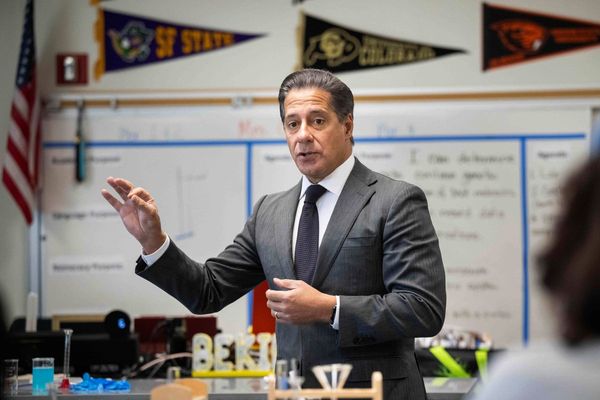
The violent murders of Doreen Langham and Hannah Clarke by their former partners should be a wakeup call to all Australian jurisdictions to consider specialist domestic violence police stations, according to experts and family members of the victims.
A trial of specialist stations has been recommended twice this week by the deputy Queensland coroner, Jane Bentley, as she handed down findings from separate inquests into the murders of Langham, on Monday, and Clarke and her children – Aaliyah, Laianah and Trey – on Wednesday.
It was the first time a state coroner in Australia has recommended such a trial be established.
Prof Kerry Carrington, a leading expert on the policing of domestic violence, has been calling for Australia to introduce specialist stations since 2015. She said her research and submissions to state and federal governments have been ignored.
“There’s been deep resistance,” she said.
Carrington, who gave evidence at the inquest into Langham’s death, agreed with the coroner that Langham may still be alive today had it not been for the inadequate police response.
“Sixteen police interacted with [Langham] in the two weeks before she died,” she said. “She made four desperate pleas for help. She reported five DVO breaches to the police and none were acted upon.
“Every opportunity to intervene was missed by the Queensland police.”
The police commissioner, Katarina Carroll, told 4BC radio on Tuesday she accepted all the recommendations of the coronial inquest.
“In Doreen’s case, there were failings in the processes to protect her,” Carroll said.
“We are going to do everything we can to be a part of changing that whole system to make sure we do make our community safer particularly for women.”
While the police response was largely ruled appropriate in Clarke’s case, the coroner still recommended urgent upgrades to officer training in dealing with domestic violence, and the trial of a specialist police station.
Carrington said specialist domestic violence police stations had made huge inroads in Brazil, Sierra Leone, India, Sri Lanka, the Philippines and Argentina, where there is one in each of the 131 police districts.
“They have a very victim-centric, family environment,” she said. “They have childcare and emergency support. Women are not met by police and are always met by a counsellor and they can also send perpetrators to perpetrator programs.
“They work with both the victims and the offenders to break the cycle and they do that very early.”
The coroner’s recommendations came amid an inquiry into the Queensland police service’s culture and its response to domestic and family violence.
But Carrington said other states should also be taking notice because Queensland police did not have a “monopoly on poor policing responses to survivors of domestic and family violence”.
The mother of Hannah Clarke, Sue Clarke, agreed all states should be considering the coroner’s suggestions.
“It’s not just a Queensland problem,” Clarke told reporters on Wednesday.
“With more education, people will understand that children are at risk as well.”
Langham’s daughters also said they would like to see the coroner’s recommendations taken up Australia wide.
The chief executive of the Domestic Violence Action Centre (DVAC), Amie Carrington, said specialist police stations were a valuable model but Queensland had achieved success by integrating experts in existing stations.
“The most important thing is that our policing culture is trauma-informed and victim-centric,” she said.
Queensland police partnered with DVAC to embed a domestic and family violence specialist in their Toowoomba station earlier this year – something Amie Carrington would like to see happen more broadly across the state.
“There’s a really big willingness within [Queensland police] to constantly improve and in my professional opinion, there is still some way to go,” she said.
But Kerry Carrington, who works separately to her daughter, Amie,
said the masculine culture established in Australian police forces had adverse consequences when responding to gender-based violence, including a reluctance to take complaints seriously and displays of “himpathy” in siding with the perpetrator.
For specialist police stations to be successful they would need their own deputy commissioner to report to, rather than a mainstream station, she said.
“When you’ve got a culture that is resistant to change, that’s male-dominated and that doesn’t see this as a problem, they’ll want this to fail.
“Australians are absolutely ready to grapple with this … They’re fed up with a policing culture that doesn’t act and doesn’t respond and doesn’t change. Women have had enough.”
Queensland’s attorney general, Shannon Fentiman, said the state government “will carefully consider the recommendations made by the deputy state coroner”.
The state’s police minister, Mark Ryan, said “significant changes” have been made in recent years in the way police record and respond to domestic and family violence incidents, “including enhancements to police policies, processes, training and technology”.
In Australia, the crisis support service Lifeline is on 13 11 14 and the national family violence counselling service is on 1800 737 732. In the UK, Samaritans can be contacted on 116 123 and the domestic abuse helpline is 0808 2000 247. In the US, the suicide prevention lifeline is 1-800-273-8255 and the domestic violence hotline is 1-800-799-SAFE (7233). Other international helplines can be found via www.befrienders.org







